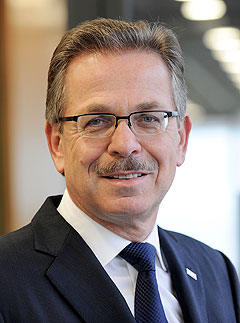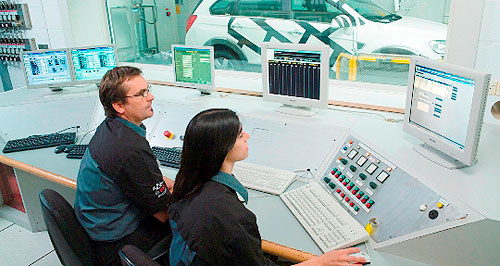Make / Model Search
News - General News - PartsBosch to shed 10,000 jobsWorking on it: Bosch is hoping for better times ahead after being forced to cut its workforce by 10,000. Global car parts giant slashes 10,000 jobs this year as sales fall 20 per cent25 Sep 2009 By TERRY MARTIN BOSCH will shed 10,000 jobs worldwide this year and maintain reduced working hours for 100,000 employees as the effects of the global economic downturn continue to plague the world’s biggest automotive supplier. Speaking at the Frankfurt motor show last week, Bosch chairman Franz Fehrenbach said sales across the entire Bosch Group were expected to fall by about 15 per cent this year, to €38 billion ($A64 billion), although in its automotive businesses, this could decline as much as 20 per cent. As a consequence, the operating results would be “clearly negative”. Mr Fehrenbach also said it could take until 2012 for Bosch to return to “pre-recession” (2007) levels and that its facilities would be under-utilised for “years to come”. “Never before has the Frankfurt motor show been held in such an economically difficult year,” he said. “While the worst of the economic turbulence seems to have passed, the structural challenges that our industry faces are becoming ever clearer.”  Left: Bosch chairman Franz Fehrenbach. Left: Bosch chairman Franz Fehrenbach.The 10,000 job cuts will reduce Bosch Group employee numbers to approximately 270,000, with 80 per cent of the reductions – 8000 – coming from Bosch’s automotive businesses, which by the end of the year will be down to 160,000 employees. In Australia, Robert Bosch moved in March to make 12 per cent of its workforce redundant, with around 170 jobs cut at its plant in Clayton, Victoria. Meanwhile, Bosch has created a new global business unit and is boosting technical staff numbers – from 400 to 500 by the end of December – to work on alternative drive technologies for hybrid and full-electric vehicles, including BMW’s forthcoming ‘Megacity Vehicle’ project, as well as on lithium-ion batteries. Mr Fehrenbach described the staff cutbacks as “still moderate compared to the overall decline in sales” and painted an optimistic picture for the future, arguing that the global automotive industry was successfully containing the effects of the “worst recession in decades” and was gearing up for one of the most promising waves of innovation “in a long time”. “This year’s Frankfurt motor show is taking place at a time in which the automotive industry is undergoing major change as its technology is transformed,” he said, singling out a number of important trends, including automotive sales growth in emerging markets, the development of new drive technologies and the ever-stricter demands imposed worldwide on environmental and passenger protection. Mr Fehrenbach said that in order to avoid further redundancies, Bosch would continue to respond to the global sales decline with “all the flexible working time measures at its disposal”. That has seen some 100,000 Bosch Group employees working on reduced hours. “We shall stand by this policy,” said Mr Fehrenbach. “Though we do expect the economic situation to improve in the course of this year.” Fourth-quarter sales are expected to increase over the weak fourth quarter of 2008, a relative improvement that should also support growth in the coming year. “At the same time, we have to look at the figures. On the whole, it could take us until 2012 to regain the levels of 2007, the pre-recession levels,” said Mr Fehrenbach. “This means that for the years to come, we expect an under-utilisation of our capacities to continue.” Despite the continuing decline, Bosch will spend €3 billion ($A5b) on research and development in its automotive businesses in 2009 in an attempt to strengthen its position in “future innovation projects”. Half of the company’s total R&D budget is being directed into green-car programs, and in concert with further technological improvements from car-makers, Bosch is targeting a 25 to 30 per cent reduction in both fuel consumption and CO2 emissions. Mr Fehrenbach said in Frankfurt that in “just a few years” it will be possible to manufacture a medium-sized car consuming less than 3L/100km and emitting “far less” than 99g/km of CO2. “Our hybrid technology is set to go into series production in 2010, and from 2011 we want to have our lithium-ion battery technology up and running on the roads,” he said. “To this end, we have set up a joint venture, SB LiMotive, with Samsung SDI. Our partners there contribute their expertise in large-scale series production of cell technology for consumer electronics, and we couple this with our systems expertise in the automotive sector. “Our investment budget for this project shows how serious we are about it – namely, some $US500 million ($A573m) dollars by 2013.” Once a new battery plant in South Korea is operational by the end of 2012, Bosch expects to be in a position to manufacture battery cells for a minimum of 125,000 hybrid and electric vehicles per year“Long-term orientation, entrepreneurial independence, financial stability – these are the principles that will continue to allow Bosch to distinguish itself,” Mr Fehrenbach said. “These are also the strengths that will count in the future innovation projects of our industry.”  Read more |
Click to shareGeneral News articlesResearch General News Motor industry news |












Facebook Twitter Instagram